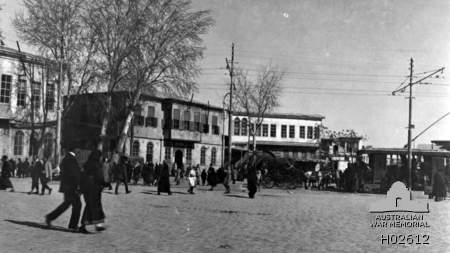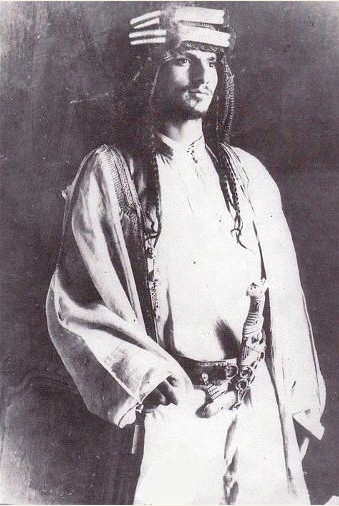|
Auda Ibu Tayi
Auda Abu Tayeh or Awda Abu Tayih ( ar, عودة أبو تايه 11 January 1874 – 27 December 1924) was the leader (shaikh) of a section of the Howeitat or Huwaytat tribe of Bedouin Arabs at the time of the Great Arab Revolt during the First World War. The Howeitat lived in what is now Saudi Arabia/Jordan. Auda was a significant figure in the Arab Revolt; outside Arabia he is mainly known through his portrayal in British Col. T. E. Lawrence's account ''Seven Pillars of Wisdom'', and from the partly fictionalised depiction of him in David Lean's film ''Lawrence of Arabia''. The Howeitat Lawrence recorded that the Jazi Howeitat had formerly been under the leadership of the House of Rashid, the amirs of Ha'il, but had since fragmented and that Auda had come to control the Eastern Howeitat, known as the abu Tayi.Lawrence, T. E. The Howeitat and their Chiefs'', ''Arab Bulletin'' report of 24 July 1917, from telawrence.net Auda had taken up the claims of his father, Harb abu Tayi ( ... [...More Info...] [...Related Items...] OR: [Wikipedia] [Google] [Baidu] |
Capture Of Damascus
The Capture of Damascus occurred on 1 October 1918 after the capture of Haifa and the victory at the Battle of Samakh which opened the way for the pursuit north from the Sea of Galilee and the Third Transjordan attack which opened the way to Deraa and the inland pursuit, after the decisive Egyptian Expeditionary Force victory at the Battle of Megiddo during the Sinai and Palestine Campaign of World War I. Damascus was captured when Desert Mounted Corps and Prince Feisal's Sherifial Hejaz Army encircled the city, after a cavalry pursuit northwards along the two main roads to Damascus. During the pursuit to Damascus, many rearguards established by remnants of the Ottoman Fourth, Seventh and Eighth Armies were attacked and captured by Prince Feisal's Sherifial Army, Desert Mounted Corps' Australian Mounted Division the 4th and the 5th Cavalry Divisions. The important tactical success of capturing Damascus resulted in political manoeuvring by representatives from France, Bri ... [...More Info...] [...Related Items...] OR: [Wikipedia] [Google] [Baidu] |
Amir
Emir (; ar, أمير ' ), sometimes transliterated amir, amier, or ameer, is a word of Arabic origin that can refer to a male monarch, aristocrat, holder of high-ranking military or political office, or other person possessing actual or ceremonial authority. The title has a long history of use in the Arab World, East Africa, West Africa, Central Asia, and the Indian subcontinent. In the modern era, when used as a formal monarchical title, it is roughly synonymous with "prince", applicable both to a son of a hereditary monarch, and to a reigning monarch of a sovereign principality, namely an emirate. The feminine form is emira ( '), a cognate for "princess". Prior to its use as a monarchical title, the term "emir" was historically used to denote a "commander", "general", or "leader" (for example, Amir al-Mu'min). In contemporary usage, "emir" is also sometimes used as either an honorary or formal title for the head of an Islamic, or Arab (regardless of religion) organisatio ... [...More Info...] [...Related Items...] OR: [Wikipedia] [Google] [Baidu] |
House Of Rashid
The Rasheed dynasty, also called Al Rasheed or the House of Rasheed ( ar, آل رشيد ; ), was a historic Arabian House or dynasty that existed in the Arabian Peninsula between 1836 and 1921. Its members were rulers of the Emirate of Ha'il and the most formidable enemies of the House of Saud, rulers of the Emirate of Nejd. They were centered in Ha'il, a city in northern Najd that derived its wealth from being on the route of the Hajj pilgrimage to Mecca, and was also a commercial center. The rulers of Ha'il were the sons of Abdullah bin Rashid, founder of the dynasty. History The Rashidi dynasty derived their name from their forebear Abdullah bin Ali Al Rashid, the first emir, who began the establishment of the Emirate of Ha'il. The Rashidi emirs co-operated closely with the Ottoman Empire. However, that co-operation became problematic as the Ottoman Empire lost popularity. In 1890, Al Rashid occupied Riyadh and then defeated the Saudi tribes, who fled into exile, first t ... [...More Info...] [...Related Items...] OR: [Wikipedia] [Google] [Baidu] |
Lawrence Of Arabia (film)
''Lawrence of Arabia'' is a 1962 British epic historical drama film based on the life of T. E. Lawrence and his 1926 book ''Seven Pillars of Wisdom''. It was directed by David Lean and produced by Sam Spiegel, through his British company Horizon Pictures and distributed by Columbia Pictures. The film stars Peter O'Toole as Lawrence with Alec Guinness playing Prince Faisal. The film also stars Jack Hawkins, Anthony Quinn, Omar Sharif, Anthony Quayle, Claude Rains and Arthur Kennedy. The screenplay was written by Robert Bolt and Michael Wilson. The film depicts Lawrence's experiences in the Ottoman provinces of Hejaz and Greater Syria during the First World War, in particular his attacks on Aqaba and Damascus and his involvement in the Arab National Council. Its themes include Lawrence's emotional struggles with the violence inherent in war, his identity and his divided allegiance between his native Britain with its army and his new-found comrades within the Arabian deser ... [...More Info...] [...Related Items...] OR: [Wikipedia] [Google] [Baidu] |
David Lean
Sir David Lean (25 March 190816 April 1991) was an English film director, producer, screenwriter and editor. Widely considered one of the most important figures in British cinema, Lean directed the large-scale epics ''The Bridge on the River Kwai'' (1957), ''Lawrence of Arabia'' (1962), ''Doctor Zhivago'' (1965), and ''A Passage to India'' (1984). He also directed the film adaptations of two Charles Dickens novels, '' Great Expectations'' (1946) and '' Oliver Twist'' (1948), as well as the romantic drama ''Brief Encounter'' (1945). Originally a film editor in the early 1930s, Lean made his directorial debut with 1942's '' In Which We Serve'', which was the first of four collaborations with Noël Coward. Beginning with '' Summertime'' in 1955, Lean began to make internationally co-produced films financed by the big Hollywood studios; in 1970, however, the critical failure of his film ''Ryan's Daughter'' led him to take a fourteen-year break from filmmaking, during which he pla ... [...More Info...] [...Related Items...] OR: [Wikipedia] [Google] [Baidu] |
Fiction
Fiction is any creative work, chiefly any narrative work, portraying individuals, events, or places that are imaginary, or in ways that are imaginary. Fictional portrayals are thus inconsistent with history, fact, or plausibility. In a traditional narrow sense, "fiction" refers to written narratives in prose often referring specifically to novels, novellas, and short stories. More broadly, however, fiction encompasses imaginary narratives expressed in any medium, including not just writings but also live theatrical performances, films, television programs, radio dramas, comics, role-playing games, and video games. Definition Typically, the fictionality of a work is publicly marketed and so the audience expects the work to deviate in some ways from the real world rather than presenting, for instance, only factually accurate portrayals or characters who are actual people. Because fiction is generally understood to not fully adhere to the real world, the themes and conte ... [...More Info...] [...Related Items...] OR: [Wikipedia] [Google] [Baidu] |
Seven Pillars Of Wisdom
''Seven Pillars of Wisdom'' is the autobiographical account of the experiences of British Army Colonel T. E. Lawrence ("Lawrence of Arabia"), of serving as a military advisor to Bedouin forces during the Arab Revolt against the Ottoman Empire of 1916 to 1918. It was completed in February 1922, but first published in December 1926. Title and dedication The title comes from the Book of Proverbs; "Wisdom hath builded her house, she hath hewn out her seven pillars" () (King James Version). Before the First World War, Lawrence had begun work on a scholarly book about seven great cities of the Middle East, to be called ''Seven Pillars of Wisdom''. It was incomplete when war broke out and Lawrence stated that he destroyed the manuscript. He used his original title for the later work. The book had to be rewritten three times, once following the loss of the manuscript on a train at Reading railway station. From ''Seven Pillars'', "... and then lost all but the Introduction and dra ... [...More Info...] [...Related Items...] OR: [Wikipedia] [Google] [Baidu] |
Colonel
Colonel (abbreviated as Col., Col or COL) is a senior military officer rank used in many countries. It is also used in some police forces and paramilitary organizations. In the 17th, 18th and 19th centuries, a colonel was typically in charge of a regiment in an army. Modern usage varies greatly, and in some cases, the term is used as an honorific title that may have no direct relationship to military service. The rank of colonel is typically above the rank of lieutenant colonel. The rank above colonel is typically called brigadier, brigade general or brigadier general. In some smaller military forces, such as those of Monaco or the Vatican, colonel is the highest rank. Equivalent naval ranks may be called captain or ship-of-the-line captain. In the Commonwealth's air force ranking system, the equivalent rank is group captain. History and origins By the end of the late medieval period, a group of "companies" was referred to as a "column" of an army. According to Raymond Ol ... [...More Info...] [...Related Items...] OR: [Wikipedia] [Google] [Baidu] |
United Kingdom
The United Kingdom of Great Britain and Northern Ireland, commonly known as the United Kingdom (UK) or Britain, is a country in Europe, off the north-western coast of the continental mainland. It comprises England, Scotland, Wales and Northern Ireland. The United Kingdom includes the island of Great Britain, the north-eastern part of the island of Ireland, and many smaller islands within the British Isles. Northern Ireland shares a land border with the Republic of Ireland; otherwise, the United Kingdom is surrounded by the Atlantic Ocean, the North Sea, the English Channel, the Celtic Sea and the Irish Sea. The total area of the United Kingdom is , with an estimated 2020 population of more than 67 million people. The United Kingdom has evolved from a series of annexations, unions and separations of constituent countries over several hundred years. The Treaty of Union between the Kingdom of England (which included Wales, annexed in 1542) and the Kingdom of Scotland in 170 ... [...More Info...] [...Related Items...] OR: [Wikipedia] [Google] [Baidu] |
Jordan
Jordan ( ar, الأردن; tr. ' ), officially the Hashemite Kingdom of Jordan,; tr. ' is a country in Western Asia. It is situated at the crossroads of Asia, Africa, and Europe, within the Levant region, on the East Bank of the Jordan River. Jordan is bordered by Saudi Arabia to the south and east, Iraq to the northeast, Syria to the north, and the Palestinian West Bank, Israel, and the Dead Sea to the west. It has a coastline in its southwest on the Gulf of Aqaba's Red Sea, which separates Jordan from Egypt. Amman is Jordan's capital and largest city, as well as its economic, political, and cultural centre. Modern-day Jordan has been inhabited by humans since the Paleolithic period. Three stable kingdoms emerged there at the end of the Bronze Age: Ammon, Moab and Edom. In the third century BC, the Arab Nabataeans established their Kingdom with Petra as the capital. Later rulers of the Transjordan region include the Assyrian, Babylonian, Roman, Byzantine, Rashidun ... [...More Info...] [...Related Items...] OR: [Wikipedia] [Google] [Baidu] |

.jpg)




